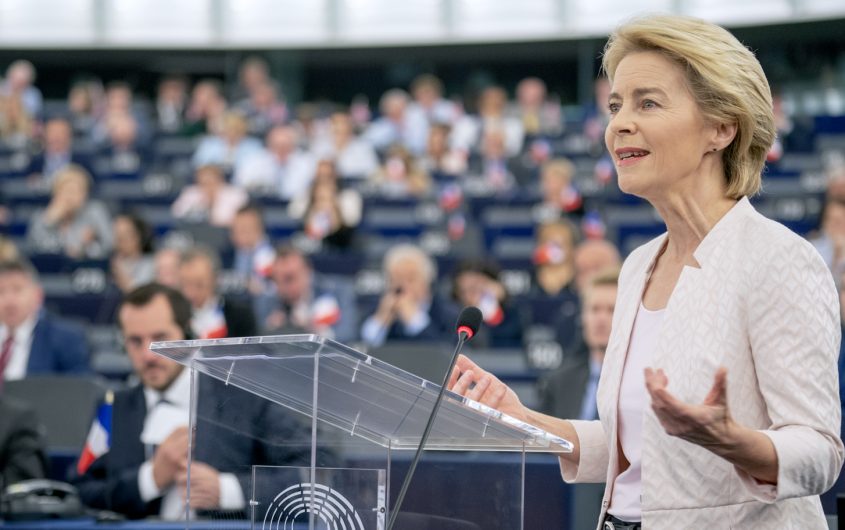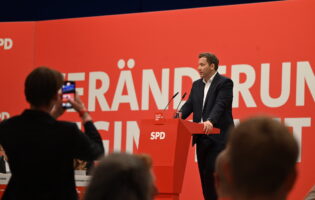
CC-BY-4.0: © European Union 2019 – Source: EP
Democracy and the Double Standard: European Parliament Responses to Ursula von der Leyen

Joyce Mushaben
University of Missouri - St. Louis
Joyce Marie Mushaben is a Curators’ Professor of Comparative Politics and former Director of the Institute for Women's & Gender Studies (2002-2005). Fluent in German, her teaching centers on comparative public policy, the European Union, women's leadership, citizenship, immigration, mega-cities and sustainability issues. Her research covers new social movements, youth protest, German unification and identities, gender, ethnicity and welfare issues, EU migration and integration studies.
Her books/monographs include Identity without a Hinterland? Continuity and Change in National Consciousness in the German Democratic Republic, 1949-1989 (1993); From Post-War to Post-Wall Generations: Changing Attitudes towards the National Question and NATO in the Federal Republic of Germany (1998); The Changing Faces of Citizenship: Integration and Mobilization among Ethnic Minorities in Germany (2008); and, Gendering the European Union: New Responses to Old Democratic Deficits (co-edited with Gabriele Abels, 2012). Her latest book focuses on Becoming Madam Chancellor: Angela Merkel and the Berlin Republic (2016). Her articles have appeared in World Politics, Polity, West European Politics, German Politics, German Politics & Society, the Journal of Peace Research, Democratization, Politics & Religion, Citizenship Studies, Journal of Ethnic & Migration Studies, German Law Review and Femina Politica. A past president of the German Studies Association (USA), she has also served on the Executive Boards of the International Association for the Study of German Politics and the German Studies Association, as well as on selection committees for Fulbright, the German Academic Exchange Service and the American Council of Learned Societies. She is a current Editorial Board member for German Politics & Society, German Politics, and Femina Politica.
Having received a 1999 Trailblazer Award and the Chancellor's Award for Excellence in Research Creativity in 2007, Mushaben is a three-time Alexander von Humboldt Fellow, a former Ford Foundation Fellow, German Marshall Fund grantee and DAAD recipient. She has held guest-scholar posts at the Academy for Social Sciences (GDR), the Center for Youth Research (GDR), the Chinese Academy of Social Sciences and the Center for Transdisciplinary Gender Research (Berlin). She was named the first Research Associate in the BMW Center for German & European Studies at Georgetown University, has enjoyed Visiting Professorships at the Ohio State University, Berlin’s Humboldt University, the Missouri-London Program and at the Universities of Erfurt, Stuttgart and Tübingen (Germany) , inter alia. Affiliated with the American Institute for Contemporary German Politics (Washington D.C.) and a designated Fulbright Specialist, she is commonly known as "Dr. J."
Feminist scholars on both sides of the Atlantic have long assumed that there is a positive correlation between women’s numerical presence in legislative bodies (descriptive representation) and their ability to adopt policies advancing gender equality (substantive representation). They further theorize that crossing the “critical mass” threshold of 30 percent will render gender-sensitive policies more or less irreversible, once they are introduced. Ironically, the 2019 elections to the European Parliament (EP)—“heralded as one of the most gender-equal elected bodies in the world”—have challenged both of those propositions, at least in the short run.[1] Women now hold 40 percent of the EP seats, an all-time high, but the increase over 2014-2019 figures (36.1%) owes, at least in part, to the gains made by Europhobic or right-wing populist parties that were subject to gender parity or women’s quota laws regulating candidate lists in the member states, particularly in France and Italy.
Equally curious is the fact that the EP’s more progressive/leftist parties declared after a grueling day of hearings on July 10, that they would not support German minister Ursula von der Leyen (CDU) in her effort to become the first female President of the European Commission. Those opposed include the 16 Social Democratic parliamentarians from Germany, even though former justice minister Katarina Barley had served amicably with the nominee in Merkel’s grand coalition government.
Von der Leyen emerged as the compromise candidate after the 28 national leaders comprising the European Council failed to agree on one of three Spitzenkandidaten nominated by the EP: Manfred Weber (CSU), Frans Timmermans (SPD), and Margrethe Vestager (ALDE). That process violated the spirit if not the letter of the law regulating the selection of the next Commission president, although the Treaty on European Union does not specifically require the selection of a pre-named “lead candidate.” In fact, Article 17 (7) TEU reads: Taking into account the elections to the European Parliament and after having held the appropriate consultations, the European Council, acting by a qualified majority, shall propose to the European Parliament a candidate for President of the Commission. This candidate shall be elected by the European Parliament by a majority of its component members. If he (sic) does not obtain the required majority, the European Council, acting by a qualified majority, shall within one month propose a new candidate who shall be elected by the European Parliament following the same procedure.
Under this wording, no woman could be considered presidential material, but have the parties reflected on that anti-democratic formulation? While conservative Manfred Weber proved unacceptable to France, the Visegrad countries rejected social democrat Timmermans due to the infringement proceedings he initiated against Poland, in particular, for having violated EU rule-of-law standards. Paradoxically, von der Leyen’s ability to secure the necessary 374 out of 747 votes may rest with the same right-wing populist parties like the Polish Law and Justice (PiS) group, Spain’s Vox, and Hungary’s Fidesz (recently suspended from the European People’s Party group), although she opposes their nationalistic, often xenophobic orientations: all the more reason for the Party of European Socialists and the Green groups to back this nominee.
Paradoxically, von der Leyen’s ability to secure the necessary 374 out of 747 votes may rest with the same right-wing populist parties like the Polish Law and Justice (PiS) group, Spain’s Vox, and Hungary’s Fidesz, although she opposes their nationalistic, often xenophobic orientations: all the more reason for the Party of European Socialists and the Green groups to back this nominee.
The Council’s “compromise package” of nominations foresees an equal number of women and men who will serve as the EP’s 14 vice presidents and as chairs of its 20 standing committees. But the election of a female Commission president would do even more to ensure that women’s interests were incorporated into future legislation “at all stages of the policy process,” starting with the “policy planning” stage—as required by EU-mandated gender mainstreaming. The Commission’s power rests largely with the ability to initiate legislation, while the actual power to decide EU policy rests with the Council and the European Parliament.
Juncker’s nomination for the Presidency in 2014 also pitted the preferences of the Council and the EP against each other, but as a designated “lead candidate,” he was not required to appear before all party groups for interrogation prior to his election. He promised a €300 billion investment plan, banking sector reforms, energy initiatives, an end to roaming charges, and new data protection rules. He offered no specific policies addressing gender inequality, despite the harsh impact of the post-2008 austerity programs on women across the EU. Given her surprise nomination, von der Leyen had less than one week to prepare for hearings with all major party delegations. She consistently stressed equality themes both in terms of better representation in key EU bodies and with respect to substantive policies (e.g., an EU-wide minimum wage). She was nonetheless criticized for her failure to provide “concrete” recommendations in response to broad questions regarding carbon emissions trading standards, sanctions against Poland, and weapons exports to combat zone countries.
The allegation that von der Leyen “until recently […] was largely unknown in Brussels” is also rather strange, given her regular participation in EU Council meetings dating back to 2005 and the diverse ministerial portfolios she has managed under four Merkel governments. She is also well-known and respected at the NATO headquarters. She internalized a commitment to “Europe” practically at birth: her father, Ernst Albrecht, served the EU in various capacities between 1954 and 1969.
Having served in all four Merkel cabinets, she has quite a “paper trail”—all pointing in a direction that no previous Commission president has ever dared to travel.
Having railed for decades against the lack of a single female Commission president, political groups committed to social inclusion, gender equality, and other forms of diversity in the EP should have first reviewed von der Leyen’s policymaking record in these areas. Having served in all four Merkel cabinets, she has quite a “paper trail”—all pointing in a direction that no previous Commission president has ever dared to travel. Her experiences as a former Minister of Family and Women, as Minister of Labor and Social Affairs, and as Germany’s longest serving Minister of Defense to date have rendered her very sensitive to equality issues, although she, like Merkel, avoids the feminist label. Indeed, von der Leyen’s promulgation of a national anti-discrimination law (Allgemeines Gleichbehandlungsgesetz, AGG) and monitoring agency in 2006 added to her purportedly “radical” calls for family-work reconciliation policies and female quotas (40%) on corporate boards, which subjected her to harsh criticism and disdain within her own male-dominated party. Just as importantly, her active promotion of expanded child care guarantees, paternal leave (current take-up rate: 35%), and countless Bundeswehr-internal reforms have been closely aligned with existing EU directives and mandates—all of which were intentionally ignored or vetoed during seven years of Red-Green government (1998-2005) under Gerhard Schröder (SPD).
As defense minister, von der Leyen has not only introduced mentoring programs for women leaders, thanks to the European Court of Justice verdict of 2000 involving Tanja Kreil. Female recruits are now also eligible for all military career tracks, including combat service “with a weapon.” She has also introduced mandatory modules for “basic training” at all levels and across all armed services, addressing sexual harassment law, unconscious bias, and other forms of discrimination. She was mocked by military hardliners for upgrading family accommodations, introducing new uniforms for pregnant soldiers, and creating options for part-time work and tele-commuting, while also ensuring that family re-deployments do not occur in the middle of a school year. She introduced “participatory processes,” bringing in a wide range of stakeholders of all ranks in compiling both the 2016 White Paper and the new Traditionserlass (Tradition Guidelines) to counter extreme-right currents and displays of Nazi memorabilia in the barracks. Her days at the defense ministry (BVM) have not been without problems, but all of her male predecessors dating back to Volker Rühe eventually lost their jobs there due to one scandal or another.[2] The BVM has proven to be a virtual minefield for anyone seeking higher office.
There is some truth to the Frankfurter Allgemeine Sonntagszeitung‘s depiction of Ursula von der Leyen as Superwoman: A medical doctor who gave birth to seven children, she had previously studied in Brussels, London, and Stanford (USA). She is fluent in two foreign languages and is the only politician to have served in all four Merkel cabinets—while still weighing in at 49 kilos, despite endless state luncheons and dinners. Asked on the TV program Hard but Fair in 2006 whether she “wanted to be a bad mother or a bad minister,” she was subsequently described as a composite of cleavage-touting “Pam [sic] Anderson, Magda Goebbels and Antje Schäffer-Kühnemann.” The analogies are absolutely tasteless—and disgustingly sexist. Find a man who can compete with her record. The double standard is alive and well.
Von der Leyen has already promised to form a Commission with equal numbers of women and men; the problem will be getting the 28 member states to nominate one of each.
Von der Leyen has already promised to form a Commission with equal numbers of women and men; the problem will be getting the 28 member states to nominate one of each. As a policy expert, I prefer someone who walks the walk, rather than talks the talk. Too many of the questions directed at von der Leyen during the July 10 hearings focused on alleged contradictions in her responses to other political party groups that day, instead of addressing her policy record. Didn’t anyone in the EP reflect on the CSU’s (and thus Weber’s) position on child care, paternal leave, refugee integration, accelerated deportations, and “clean coal”? As a CDU member, von der Leyen would, in fact, represent the EPP’s “winning” plurality, in contrast to Timmermans and Vestager, whose nominations would violate Art 17(7) in a strictly legal sense by not “taking into account” the actual EP election results. Von der Leyen has, moreover, offered Timmermans a seat on the Commission to pursue rule-of-law sanctions against renegade member states like Poland.
Progressive parties in the European Parliament have used the hearings on von der Leyen’s nomination for the Commission presidency the same way that politicians routinely use national legislative tribunals: namely to posture and grandstand, as if in permanent campaign mode. Through the 1980s and 1990s, the EP effectively expanded its own powers by largely cooperating with the Commission—via feminist “velvet triangles”—to counter the self-interested powers of the Council. Given the gender and diversity monitoring bodies she established across the defense ministry, von der Leyen is very likely to re-create much of the “gender machinery” that Barosso eliminated during his two terms as Commission president.
Ursula von der Leyen firmly believes that Europe should assume new responsibility for its own defense and is a strong advocate of Permanent Structured Cooperation (PESCO). She wants a healthy, sustainable world for everyone’s children, supports LBGTQ rights, and recognizes the EU’s collective, humanitarian obligation toward countless refugees facing torture in Libya or watery deaths in the Mediterranean. The Spitzenkandidat process clearly needs to be refined, but this is a bad reason for MEPs to reject an unprecedented opportunity to finally put an equality-driven woman in charge of the European Commission.
[1] Jessica Fortin-Rittberger and Berthold Rittberger, “Do electoral rules matter? Explaining national differences in women’s representation in the European Parliament,“ European Union Politics 15, No. 4 (2014), 496.
[2] See Christoph Betram, “Die Nazis im Nacken: Volker Rühe bring die Bundeswehr ins Zwielicht – sein autoritärer Führungsstil hat versagt,” Die Zeit, December 19, 1997. Inter alia, Thomas de Maizière was forced out over cost over-runs involving the Euro-Hawk drone; zu Guttenberg resigned after it was determined that he had plagiarized his dissertation.









